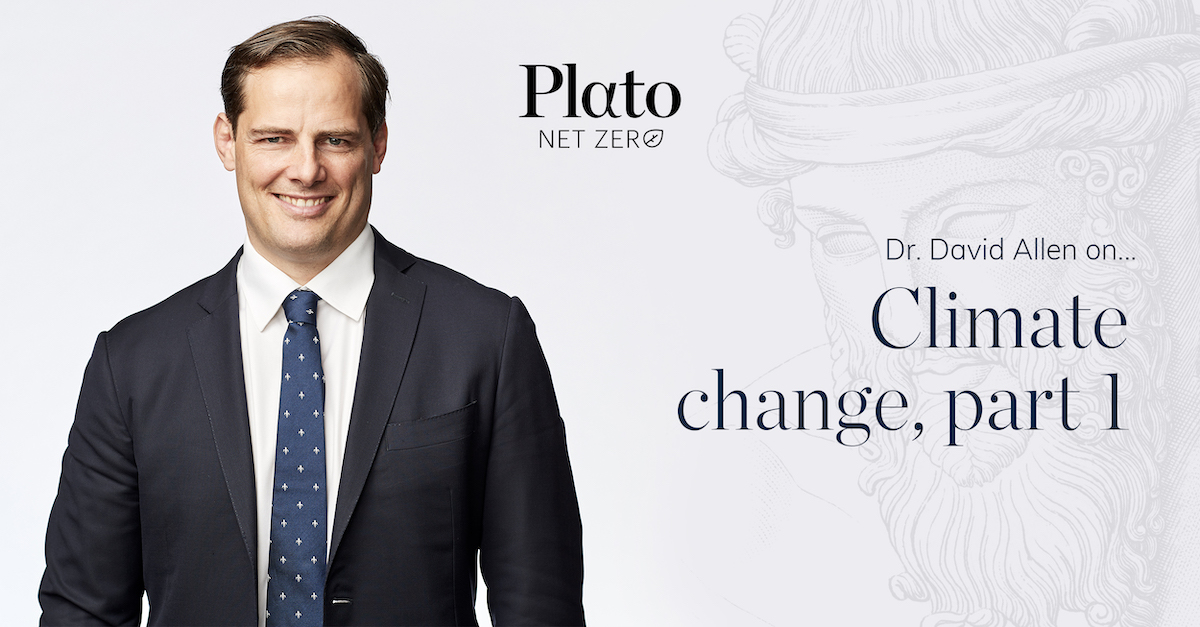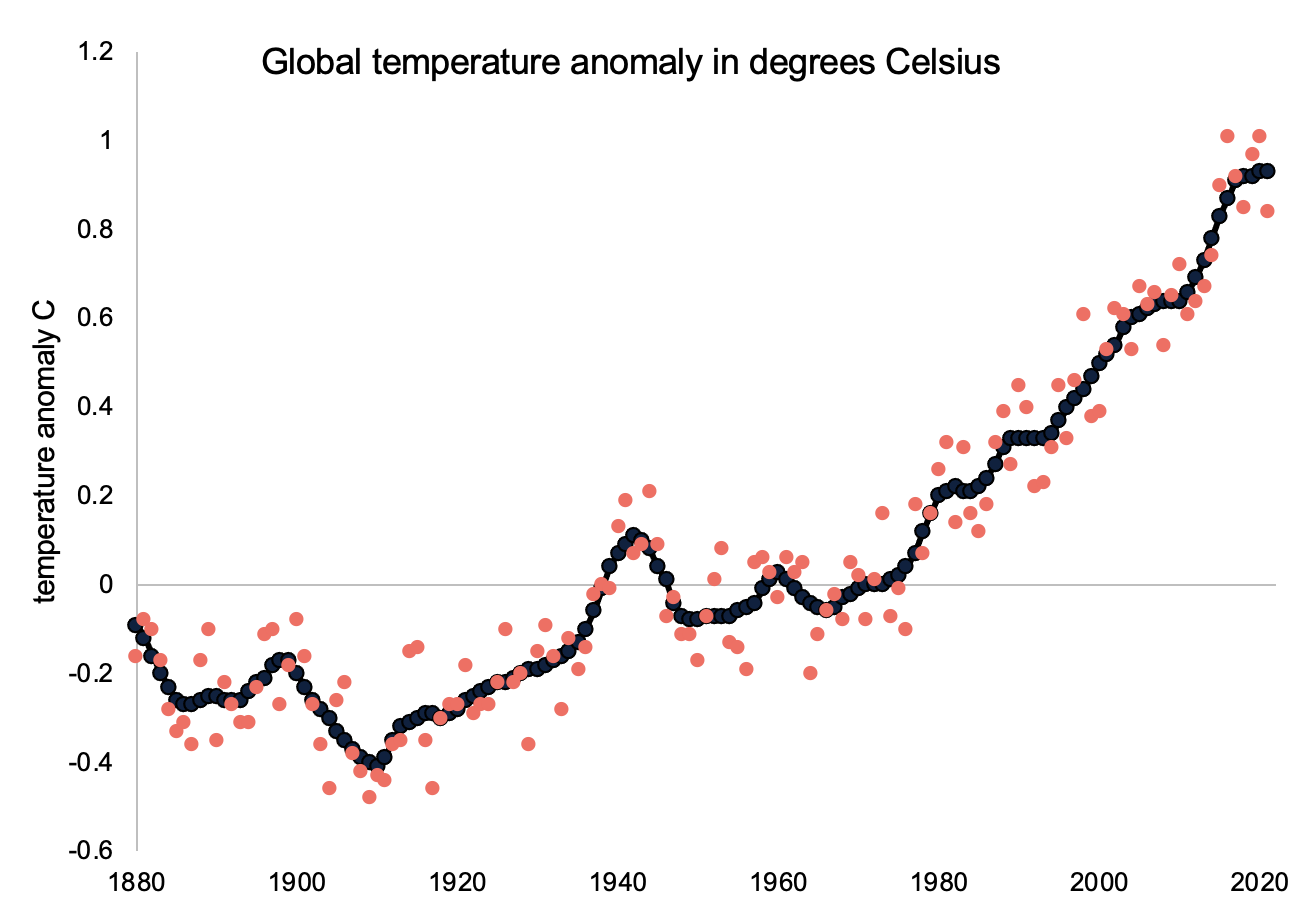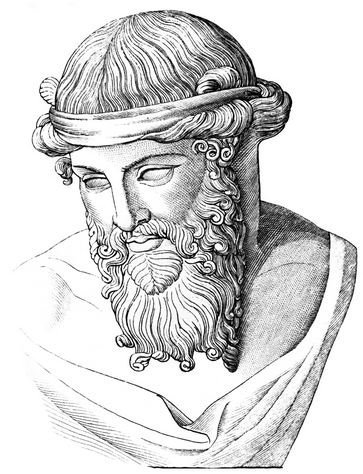
Dr. David Allen
The Earth’s climate is in a constant state of flux. Over the last 800,000 years there have been no less than eight ice ages punctuated by warmer periods. These ice ages are driven by slight changes in the Earth’s orbit around the sun known as Milankovitch cycles. Modern civilisation as we know it, emerged since the end of the last ice-age around 10,000 years ago.
The warming that we are witnessing over the last 30 years however is unprecedented.
Paleoclimate data indicates that the planet is warming roughly ten times faster than the average rate of warming after previous ice ages.1
The chart below shows the “temperature anomaly” since 1880.2 According to NASA, the 15 warmest years on record have occurred since 2005, and the previous eight years are the hottest ever recorded.

Source: NASA Goddard Institute for Space Studies (GISS)
There is a robust consensus in the scientific community that the speed of this warming pattern is driven by the dramatic increase in the levels of green-house gasses in the atmosphere caused by human activity. The Intergovernmental Panel on Climate Change (IPCC) state that: “Since systematic scientific assessments began in the 1970s, the influence of human activity on the warming of the climate system has evolved from theory to established fact.”3
Approximately 97% of climate scientists believe that climate change is a reality and is caused by human activity.4
The chart below shows how CO2 levels have varied over the last 800,000 years using paleo ice-core data. CO2 levels over this entire period never exceed 300 parts per million (ppm). CO2 levels gradually started to increase from the industrial revolution which began in 1870. It is only in the last thirty years however that CO2 levels have exploded reaching 420 ppm in 2022. Under a business as usual scenario the OECD predicts CO2 will reach 685 ppm by 2050.
The effects of climate change are already striking.
In part II of this series we will look at some NASA satellite imagery that highlights just how rapidly our world is changing. Stay tuned.
About the Author

Dr David Allen is head of Short/Long Strategies at Plato, managing the Plato Global Net Zero Hedge Fund. He holds a PhD from Cambridge and Bachelor of Business with First Class Honours.
1https://climate.nasa.gov/evidence/#otp_evidence
2Data courtesy of NASA’s Goddard Institute for Space Studies (GISS)
3IPCC Sixth Assessment Report, WGI, Technical Summary; B.D. Santer et.al., “A search for human influences on the thermal structure of the atmosphere,” Nature vol 382, 4 July 1996, 39-46 ; Gabriele C. Hegerl, “Detecting Greenhouse-Gas-Induced Climate Change with an Optimal Fingerprint Method,” Journal of Climate, v. 9, October 1996, 2281-2306; V. Ramaswamy et.al., “Anthropogenic and Natural Influences in the Evolution of Lower Stratospheric Cooling,” Science 311 (24 February 2006), 1138-1141; B.D. Santer et.al., “Contributions of Anthropogenic and Natural Forcing to Recent Tropopause Height Changes,” Science vol. 301 (25 July 2003), 479-483; T. Westerhold et. al., “An astronomically dated record of Earth’s climate and its predictability over the last 66 million years,” Science vol. 369 (11 Sept. 2020), 1383-1387.
4AAAS Board Statement on Climate Change (2014)
DISCLAIMER:
This communication is prepared by Plato Investment Management Limited (‘Plato’) (ABN 77 120 730 136, AFSL 504616) as the investment manager of the Plato Global Net Zero Hedge Fund (ARSN 654 914 048) (‘the Fund’). Pinnacle Fund Services Limited (‘PFSL’) (ABN 29 082 494 362, AFSL 238371) is the product issuer of the Fund. PFSL is not licensed to provide financial product advice. PFSL is a wholly-owned subsidiary of the Pinnacle Investment Management Group Limited (‘Pinnacle’) (ABN 22 100 325 184). The Product Disclosure Statement (‘PDS’) and Target Market Determination (‘TMD’) of the Fund are available via the links below. Any potential investor should consider the PDS and TMD before deciding whether to acquire, or continue to hold units in, the Fund.
Link to the Product Disclosure Statement
Link to the Target Market Determination
For historic TMD’s please contact Pinnacle client service Phone 1300 010 311 or Email service@pinnacleinvestment.com
This communication is for general information only. It is not intended as a securities recommendation or statement of opinion intended to influence a person or persons in making a decision in relation to investment. It has been prepared without taking account of any person’s objectives, financial situation or needs. Any persons relying on this information should obtain professional advice before doing so. Past performance is for illustrative purposes only and is not indicative of future performance.
Whilst Plato, PFSL and Pinnacle believe the information contained in this communication is reliable, no warranty is given as to its accuracy, reliability or completeness and persons relying on this information do so at their own risk. Subject to any liability which cannot be excluded under the relevant laws, Plato, PFSL and Pinnacle disclaim all liability to any person relying on the information contained in this communication in respect of any loss or damage (including consequential loss or damage), however caused, which may be suffered or arise directly or indirectly in respect of such information. This disclaimer extends to any entity that may distribute this communication.
Any opinions and forecasts reflect the judgment and assumptions of Plato and its representatives on the basis of information available as at the date of publication and may later change without notice. Any projections contained in this presentation are estimates only and may not be realised in the future.
Unauthorised use, copying, distribution, replication, posting, transmitting, publication, display, or reproduction in whole or in part of the information contained in this communication is prohibited without obtaining prior written permission from Plato. Pinnacle and its associates may have interests in financial products and may receive fees from companies referred to during this communication.
“A good decision is based on knowledge and not on numbers.”
Plato (427-347 BC)



